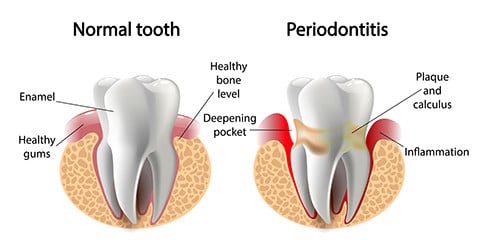Periodontal disease is a progressive, infectious condition that often catches patients unaware because the initial stages frequently have little or no symptoms. The beginning stage of periodontal disease is referred to as gingivitis, and although some patients begin to notice a slight amount of pain in their gum tissues at its onset, many don’t feel a thing. Some people notice bleeding gums during or after the process of flossing, but this may not occur until the infection has significantly progressed. Others may notice but believe it’s just a natural part of the aging process. Whatever the reason, gingivitis is often reversible if detected in the very early stages, but if nothing is done, it will invariably progress to its more serious counterpart, full-blown periodontal disease.
What Are the Signs of Periodontal Disease?
Besides bleeding gums during or after brushing or flossing, possible indications that periodontal disease may be a part of the picture include red, swollen, and tender gum tissues. The teeth may become increasingly sensitive, pockets may begin to develop between teeth and gum tissues, and patients may start to experience halitosis or bad breath.
What Happens if Periodontal Disease is Left Untreated?
If gum disease is left to progress on its own, patients may wind up with loose teeth, losing teeth altogether and consequently requiring implants, bridges, or even full dentures, and cavities. However, the adverse effects of unchecked periodontal disease affect more than dental health — the bacteria associated with the infection also has the potential to enter the bloodstream of patients and contribute to a variety of serious conditions. Periodontal disease has been associated with decreased cardiovascular health, increased risk of developing Type II diabetes, and an elevated risk of developing rheumatoid arthritis.
Who’s At Risk?
Even though older patients are more vulnerable to the development of gum disease, it can happen at any age. The main determining factor is the degree of oral hygiene practiced by the patient. Those who fail to brush and floss on a regular basis increase their risk of developing gingivitis and periodontal disease. Pregnant women and those using oral contraceptives are also at increased risk as well as those who are taking certain types of cancer medication. Also at risk are those who regularly use tobacco products, sip on sugary sodas or beverages containing alcohol, or have Type II diabetes.
What Are Some Common Treatments for Periodontal Disease?
Treatments for periodontal disease depend highly on how far the condition has progressed. Those diagnosed with initial-stage gingivitis can often stop or reverse the condition by practices good oral hygiene and including an antibacterial mouthwash in their routine. Those with more advanced conditions may benefit from procedures known as scaling and root planing.
Scaling is a deep-cleaning procedure that removes bacterial deposits from the pockets between gum tissue and teeth in the region under the gum line. Root planing smooths the root area to remove rough surface patches to make it more difficult for bacteria to attach.
Are Antibiotics Useful in the Treatment of Periodontal Disease?
The short answer to this question is “yes.” Periodontal disease is an infection of the gum tissues, and like all infections, its destructive effects may be eliminated or greatly reduced as the result of a course of antibiotic medication. Following are the three most commonly used antibiotics in the treatment of periodontal disease:
- Systemic antibiotics — these are administered for the purpose of getting an acute infection under control. They come in pill form and can also be given via intramuscular injection or I.V.
- Local Antibiotics — these are topical treatments in the form of chips, gels, or fibers that are placed under the gum to control localized infections.
- Low-Dose, Host Modulated Antibiotics — used as a supplement to comprehensive treatment programs, low-dose antibiotics are sometimes prescribed to patients with periodontal disease. Although they won’t kill the infection, they’ll bring it down to a manageable level.
Dr. Benjamin Metz has extensive experience in the periodontal field of dentistry and makes a point of keeping current on state-of-the-art treatment strategies and procedures. Please feel free to contact us for more information or schedule an appointment online. We have three separate locations to provide you with ultimate convenience.


